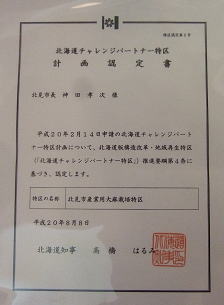Industrial hemp of Hokkaido -the challenge towards a future-
Industrial Hemp Cultivation Special Zone in Kitami City 2008 - 2011
 Special zone certificate
Special zone certificate
------------------------------------------------------------------------------------------
On the sixth of this month, Hokkaido Prefecture approved the creation of
an Industrial Hemp Cultivation Special Zone in Kitami City as part of the
Hokkaido Challenge Partner Special Zones, which is the Hokkaido version
of the national program of Special Zones for Structural Reform. The prefecture
has agreed to support efforts to utilize hemp containing a low level of
narcotic agents for applications including the production of building materials.
The Challenge Partner Special Zone program was established in fiscal year
2004, and so far, four regions have been selected for participation. The
Special Zone that was approved in Kitami City aims to establish a system
for cultivating hemp on fallow farmland. Among other efforts, the prefecture
will help prepare an inspection system to enable farmers to acquire hemp
seeds, which are subject to strict import and distribution regulations.
The Hokkaido prefectural government is set to issue a certificate to the
city on the 8th.
Source: Hokkaido Shimbun Press, August 6th, 2008
------------------------------------------------------------------------------------------
Details concerning the special zone are as follows.
Hokkaido Challenge Partner Special Zone
Regarding the approval of the plan to create a Hokkaido version of a Structural Reform/Regional Revitalization Special Zone (Hokkaido Challenge Partner Special Zone)
This is to announce that the plan received from Kitami City on February 14th, 2008 regarding the upcoming Challenge Partner Special Zone has been approved.
| Applicant | Kitami City |
| Plan Name | Kitami City Industrial Hemp Cultivation Special Zone |
| Plan Overview | The Industry Cluster Study Group Okhotsk focuses on the cultivation of industrial hemp (cannabis containing an extremely low level of narcotic agents) to create business opportunities in the construction industry as well as in entirely new industries. After establishing a pathway for reliable seed procurement, the study group aims to achieve rapid commercialization of the processing methods/sales routes for products including building materials and foods. Through these efforts, we intend to secure successors in the agriculture industry, generate local employment, create new businesses, and revitalize the region. |
| Details of measures on which we are requesting prefectural support |
The creation of a Special Project Team Establish a Special Project Team to consider creating a system to cultivate hemp containing little or no narcotic agents and promote industrial hemp cultivation. ・Establish a THC test system ・Establish a cultivation system for this new industrial crop, and sort out the tasks necessary for the creation of a new industry. |
| Certification date | August 8th, 2008 |
The Challenge Partner Special Zone is Certification No. 5.
Hokkaido Challenge Partner Special Zone Plan
(goals, and a selection of matters deemed necessary by the municipalities)
6. Plan objectives
The Industry Cluster Study Group Okhotsk promotes the cultivation of industrial hemp containing extremely low levels of narcotic agents on fallow farmland for use in construction as well as in new industries. The intent is to process and sell the hemp for building materials, foods, and other uses.
We have already completed various prototype tests, and have researched methods for commercialization. Once we have established a pathway for reliable seed procurement and explored possible factory facilities for primary processing, we hope to achieve rapid commercialization.
(1) Seed procurement
The Tochigi Agricultural Experiment Station in Tochigi Prefecture successfully
breeded "Tochigishiro," a variety of non-toxic hemp, in 1982.
Currently, Tochigishiro hemp is the only variety permitted for cultivation
in Tochigi Prefecture. In Europe, there are countries that have implemented
a system whereby the government entrusts certain companies with the authority
to manage hemp seeds and develop industrial hemp cultivars with low THC
content and high germination rates. Under this system, hemp farmers must
purchase from such a company.
This case underlines the importance of procuring reliable sources of high-quality seeds, including in the aspects of safety and germination rates, and constructing an adequate management system, to enable large-scale agriculture.
(2) Exploring options for the construction of a primary processing plant
Collaborations for carrying out secondary processing have already been established with respect to the construction of prototype board-like building materials. Yet with the exception of manufacturing plants for agricultural machinery, there is close to zero technical capability available in the region for designing and producing equipment lines for factory construction, and there is a clear need to establish a cooperative relationship with a manufacturing company.
9. Matters deemed necessary by municipalities
(1) Initiatives undertaken by the Industrial Cluster Study Group Okhotsk
The Industry Cluster Study Group Okhotsk was established in April of 1997 to encourage cooperation between industry, academia, and government, carry out specialized research, and investigate policies for developing core industries that can acquire a sustainable economic foundation in Kitami and the wider Okhotsk area. Since 2002, the group has carried out research that focuses on product development using industrial hemp. Moving forward, the group intends to remain at the center of this issue and will conduct further research on commercialization including through study groups.
(2) Business promotion based on the Kitami Regional Industry Promotion Vision of the Ministry of Economy, Trade and Industry
This vision also stresses the importance of promoting the development of building materials, etc., using industrial hemp. Furthermore, the vision supports the initiative under discussion by reiterating the importance of encouraging new business creation including through cutting-edge technological development and cooperation between industry, academia, and government.
The results of discussions with the Special Zone
We identified the issues involved in large-scale cultivation on 1,000 or 10,000 hectares and discussed the ways in which the Hokkaido Government Office could address each issue.
However, the answers we received for every issue cited "legal difficulties, a lack of people, and a lack of funds," and in reality we made virtually no progress.
Unfortunately, it is clear that issues that have been solved in foreign countries even without special zone designation cannot be solved at all in Japan.